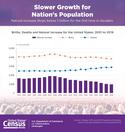Demography becomes destiny, the old adage goes. But many of the most confidently promoted demographic predictions have turned out grossly exaggerated or even dead wrong. In many cases they tend to reflect more the aspirations of pundits and reporters than the actual on-the-ground realities. read more »
Demographics
Heartland Intelligence
There have been some big changes for me. We relocated from New York to Indianapolis, where I’m doing consulting work for the Indy Chamber. I’m no longer full time with the Manhattan Institute but am still a contributing editor at City Journal and still have multiple projects in the works there. I’ll continue to write for other publications too, as with my recent Atlantic piece on J. Irwin Miller and Columbus, Indiana. More on my move below. read more »
- Login to post comments
Report: State of Contradiction
California has been at the vanguard of family change in America. Culturally and legally—from the Human Potential Movement to the passage of no-fault divorce under then-Gov. Ronald Reagan, from Hollywood movies and shows like “The Graduate” and “Friends”—the Golden State has played a central role in pioneering and representing the cultural attitudes that have transformed marriage and family life across the nation. read more »
- Login to post comments
Population Growth Concentrated in Auto Oriented Suburbs and Metropolitan Areas
The suburbs and exurbs continue to dominate population growth in the nation’s 53 major metropolitan areas, according to a City Sector Model (Note 1 and Figure 9) analysis. We traced growth between the 2010 Census and the American Community Survey 5-year data, from samples taken over the period of 2014 to 2018. The middle-year was 2016 (Note 2).
Population Growth by City Sector read more »
- Login to post comments
Against Tribal America
Perhaps nothing so animates the progressive Left today as the notion of an increasingly race-conscious society, segregated by ethnic identity and dismissive of the traditional ideal of assimilation. If this seems ironic, it should—in the not-so-distant past, this was a position embraced by the reactionary Right, particularly in the Jim Crow South. read more »
- Login to post comments
US Population Growth Down 1/3 in 5 Years, California Down 85%
The United States population grew just 0.48% in the year ended July 1, 2019, according to population estimates released on the last day of the year. This is a full one-third decline from the 0.72% growth in 2014. Even that higher rate, typical for the first four years of the decade, was well below the 0.93% rate between 2000 and 2010. This was driven by a decline in the natural growth rate (births minus deaths), which fell from 1,461,000 in 2011 to 957,000 in 2019. read more »
Walking Around Downtown Brooklyn
After having lost more than half a million residents between 1950 and 1980 New York’s borough of Brooklyn has regained more than two-thirds of its population loss. The renaissance of Brooklyn is rightfully cited as an urban success story. It initially attracted Millennials and others seeking an urban lifestyle at a lower cost than Manhattan, but now it has also become increasingly more expensive, evidenced by many new high rise luxury condominium buildings. read more »
- Login to post comments
Is America About to Suffer Its Weimar Moment?
Is America about to suffer its Weimar moment, culminating in the collapse of its republican institutions? Our democracy may be far more rooted than that of Germany’s first republic, which fell in 1933 to Adolf Hitler, but there are disturbing similarities. read more »
Amplified Advantage: Why Education is Not the Answer to Our Class Problems
Thirty years ago, after having dropped out of college after just one term, unable to pay for my dorm room, I was unsure if I would ever leave the working class. Two years later I was a student at Barnard College, an elite small liberal arts college three thousand miles from my parents’ home. To this day, I am not sure how I made that leap, but it was smoothed over by significant financial assistance from the college. Unable to pay for my public university, I was able to graduate from one of the best private colleges in the country virtually debt-free. read more »
- Login to post comments
California Preening: Golden State on Path to High-Tech Feudalism
“We are the modern equivalent of the ancient city-states of Athens and Sparta. California has the ideas of Athens and the power of Sparta,” declared then-governor Arnold Schwarzenegger in 2007. “Not only can we lead California into the future . . . we can show the nation and the world how to get there.” When a movie star who once played Hercules says so who’s to disagree? read more »
- Login to post comments






















